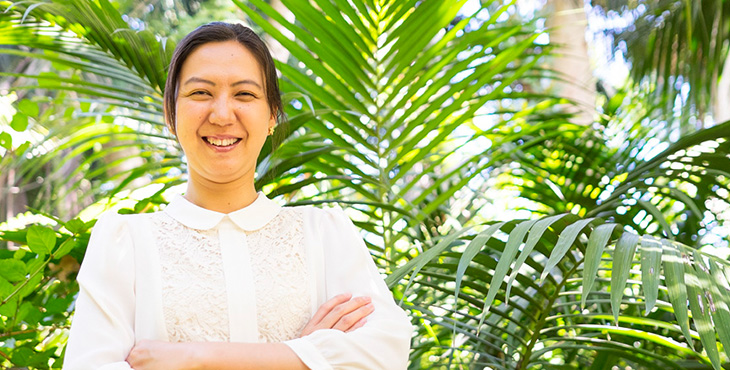
About Nang
Doctor and humanitarian worker Nang Nge Nge Phoo is relishing the opportunity to further her studies in Public Health at UWA with the Inaugural Woodside Myanmar postgraduate scholarship. She sees education as an important way forward for her homeland of Myanmar, formerly Burma.
Nang has worked as a medical officer and township coordinator in communicable diseases such as tuberculosis, HIV, malaria and diarrhoea. She has also been involved with Médecins Sans Frontières and worked as health manager focusing on health and hygiene, and maternal and child health promotion. Most recently Nang has worked in community development.
The biggest health challenges facing the people of Myanmar
As Myanmar is a developing country, there is a double burden with both communicable and non-communicable diseases. The burden of tuberculosis, multi-drug resistant tuberculosis and HIV in Myanmar is high. Sixty per cent of the population lives in areas at risk of malaria, and 48 per cent of mortality is due to four leading non-communicable diseases: cardiovascular disease, cancer, chronic respiratory disease and diabetes. As the general government expenditure on health is low, out-of-pocket expenditure by citizens is very high.
Strengthening the health system including infrastructure, service capacities, financing and information management systems are priority areas that need to be improved.
The power of a UWA education
Studying at UWA will provide me with a broader view of how we can improve community health in Myanmar. It will enable me to develop possible solutions for existing and emerging public health issues.
By learning quantitative and qualitative health research methods, I will be able to assess the causes, determinants and intensity of the health issues. Studying comparative health systems will enable me to identify areas in the current health care system that need attention and find ways to fill the gaps.
By increasing my leadership, change management and decision making skills I will become a better champion for the people of Myanmar.
I plan to apply the knowledge, attitude and skills I develop through my study when I return to Myanmar, and to share them with others. In addition to the course-related education, I look forward to engaging with classmates from different backgrounds, education, experience and environments and keeping in touch with them when I return home.
I will be part of a global network and with the knowledge I receive from UWA, I will be able to contribute more effectively to enhance Myanmar’s health service capacities, which is a priority there.